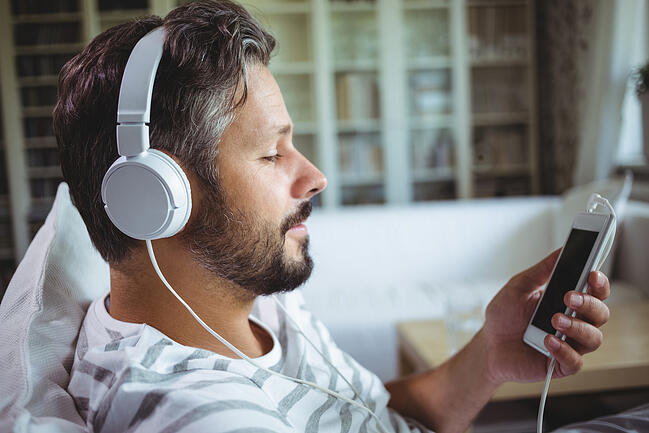
Does Music Help?
A 2005 study among elderly adults in Taiwan showed that there was an improvement in sleep quality for those who listened to calming music while going to sleep. Even though the study was focused on elderly adults, other studies have shown music to be beneficial at any age, including those that have long or short-term sleep issues. Along with improved sleep quality, music can also aid in falling asleep faster. Of course, there may be some people that may not find music effective or may even find it disruptive, so it also depends on the individual. Music may not have a huge impact on sleep in the very beginning, but it may help over time as one adjusts to listening to music in bed.
How Does it Work?
Part of why music helps with sleep is that it reduces stress in the body by releasing dopamine to the brain. Music can also contribute to the relaxation of some parts of the body like the digestive system, lungs and heart. Music can also help improve your mood and lessen symptoms of depression, which is something that is usually associated with poor sleep. Likewise, music can lower blood pressure, heart rate, respiratory rate and even anxiety levels. Since the right music can help keep the mind away from thoughts that could keep you awake, it can lead to calming you down and help you fall asleep easier.
What Type of Music Works Best?
Because everyone has their own preferences and reacts differently to various genres of music, no one type of music universally works for everyone. That said, there are some things to consider when listening to music while falling asleep. Usually, slow-tempo songs or instrumental music tends to work better to calm your body down rather than playing fast-paced songs.
It also helps to avoid music that has sudden tempo changes and instead use songs that have slower changes throughout. Volume should be kept low enough to not be intrusive to sleep, but also not too low that it becomes ineffective. Avoid using earbuds or headphones, as using either one for long periods can also cause ear damage. If possible, place the speakers away from your head and make sure there is no light emitting from the music source.
How Long Does it Take for Music to Improve Sleep?
Music will not instantly improve sleep. So how long does it usually take? While it will vary for everyone, it usually takes up to a month before any noticeable changes occur. This can be different for some people, as most studies have noted changes between two to four weeks. It is best to make it a nightly routine to get used to it and for any significant impact to come.
A good night’s sleep is just as important as healthy food and regular exercise. Did you know that you spend nearly one-third of your life sleeping? So you better be good at it!
Good sleep is imperative for better health. If you fall short of sleep, your energy during the day, productivity, emotional balance, and weight all get affected.
If you want to sleep better, then you are in the right place. Call one of Alaska Sleep Clinic’s locations today, in Anchorage, Fairbanks, Soldotna, and Wasilla. Improve Your Sleep. Improve Your Life.

According to several studies, music does have a positive effect on sleep quality, and the time it takes to fall asleep. Though there are many different factors that could impact the effectiveness of sleep, playing calming music at a low volume a few feet away from the bed over several weeks could significantly improve sleep quality. If you are having a challenging time preparing your mind for bed, a little bit of music may make a difference.
Michael Morehouse is a junior from Mishawaka, Indiana, majoring in public relations and minoring in writing. Michael is an associate with Fifth Street Communications®, a student-run public relations agency at Anderson University.











